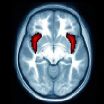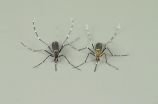(Press-News.org) MINNEAPOLIS - Taking vitamin B12 and folic acid supplements may not reduce the risk of memory and thinking problems after all, according to a new study published in the November 12, 2014, online issue of Neurology®, the medical journal of the American Academy of Neurology. The study is one of the largest to date to test long-term use of supplements and thinking and memory skills.
The study involved people with high blood levels of homocysteine, an amino acid. High levels of homocysteine have been linked to memory loss and Alzheimer's disease.
"Since homocysteine levels can be lowered with folic acid and vitamin B12 supplements, the hope has been that taking these vitamins could also reduce the risk of memory loss and Alzheimer's disease," said study author Rosalie Dhonukshe-Rutten, PhD, of Wageningen University in Wageningen, the Netherlands.
Early observational studies showed there may be some benefit to thinking and memory skills in taking folic acid and vitamin B12, but the results of later randomized, controlled trials were less convincing.
For the current study, 2,919 people with an average age of 74 took either a tablet with 400 μg of folic acid and 500 μg of vitamin B12 or a placebo every day for two years. Tests of memory and thinking skills were performed at the beginning and end of the study. All of the participants had high blood levels of homocysteine.
"While the homocysteine levels decreased by more in the group taking the B vitamins than in the group taking the placebo, unfortunately there was no difference between the two groups in the scores on the thinking and memory tests," said Dhonukshe-Rutten.
The study was supported by the Netherlands Organization for Health Research and Development, the Dutch Dairy Association, MCO Health, Netherlands Consortium Healthy Aging, Dutch Ministry of Economic Affairs, Agriculture and Innovation, Wageningen University, VU University Medical Center and Erasmus Medical Center, all based in the Netherlands.
INFORMATION:
To learn more about brain health, please visit http://www.aan.com/patients.
The American Academy of Neurology, an association of more than 28,000 neurologists and neuroscience professionals, is dedicated to promoting the highest quality patient-centered neurologic care. A neurologist is a doctor with specialized training in diagnosing, treating and managing disorders of the brain and nervous system such as Alzheimer's disease, stroke, migraine, multiple sclerosis, brain injury, Parkinson's disease and epilepsy.
For more information about the American Academy of Neurology, visit http://www.aan.com or find us on Facebook, Twitter, Google+ and YouTube.
Media Contacts:
Rachel Seroka, rseroka@aan.com, (612) 928-6129
Michelle Uher, muher@aan.com, (612) 928-6120
A protein that may partly explain why human brains are larger than those of other animals has been identified by scientists from two stem-cell labs at UC San Francisco, in research published in the November 13, 2014 issue of Nature.
Key experiments by the UCSF researchers revealed that the protein, called PDGFD, is made in growing brains of humans, but not in mice, and appears necessary for normal proliferation of human brain stem cells growing in a lab dish.
The scientists made their discovery as part of research in which they identified genes that are activated to ...
U.S. Army soldiers hospitalized with a psychiatric disorder have a significantly elevated suicide risk in the year following discharge from the hospital, according to research from the Army Study to Assess Risk and Resilience in Servicemembers (Army STARRS). The yearly suicide rate for this group, 263.9 per 100,000 soldiers, was far higher than the rate of 18.5 suicides per 100,000 in the Regular Army for the same study period, the study found.
The researchers looked at data from the 12 months following a hospital discharge for more than 40,000 anonymous, Regular Army ...
It has long been known that patients recently discharged from psychiatric hospitalizations have a significantly elevated suicide risk. However, the rarity of suicide even in this high-risk segment of the population makes it impractical to justify providing intensive post-hospital suicide prevention programs to all recently discharged patients. Targeted programs for patients at especially high suicide risk would be more feasible, but it is difficult for clinicians to predict with good accuracy which patients are at high risk for suicide.
A new report published online today ...
Nearly a quarter of all patients who underwent initial breast conservation surgery (BCS) for breast cancer had a subsequent surgical intervention, according to a report published online by JAMA Surgery.
Completely removing breast cancer is seen as the best way to reduce recurrence and improve survival. A lack of consensus on an adequate margin width has led to variable rates of reexcision and, as a result, patients undergo repeat or additional surgeries, according to background information provided in the study.
Lee G. Wilke, M.D., of the University of Wisconsin School ...
A study that looked at predicting suicides in U.S. Army soldiers after they are hospitalized for a psychiatric disorder suggests that nearly 53 percent of posthospitalization suicides occurred following the 5 percent of hospitalizations with the highest predicted suicide risk, according to a report in JAMA Psychiatry.
The suicide rate in the U.S. Army has increased since 2004 and now exceeds the rate among civilians. Still, suicide is a rare outcome even among recently discharged psychiatric patients. A potentially promising approach to assess posthospitalization suicide ...
SEATTLE - Preterm birth is now the leading cause of death for children under 5 worldwide, and a new scientific paper reveals a startling lack of knowledge about what causes it and how to prevent it.
Published in the November issue of Science Translational Medicine, "Prevention of Preterm Birth: Harnessing Science to Address the Global Epidemic" shines a light on the urgent need for a larger, coordinated research effort to discover how to identify women at risk of preterm birth and develop prevention interventions.
"There are not enough resources dedicated to researching ...
Older women with disordered breathing during sleep were found to be at greater risk of decline in the ability to perform daily activities, such as grocery shopping and meal preparation, according to a new study led by researchers at the Johns Hopkins Bloomberg School of Public Health and the University of California, San Francisco.
The study was published Nov. 6 in the online edition of the Journal of the American Geriatrics Society.
The findings are notable given the aging of the population - an estimated 3.7 million Americans will turn 65 in 2015, and by 2030, 19 ...
In school-age children previously diagnosed with depression as preschoolers, a key brain region involved in emotion is smaller than in their peers who were not depressed, scientists have shown.
The research, by a team at Washington University School of Medicine in St. Louis, also suggests that the size of the brain's right anterior insula may predict the risk of future bouts of depression, potentially giving researchers an anatomical marker to identify those at high risk for recurrence.
The study is published online Nov. 12 in the journal JAMA Psychiatry.
There is ...
One of the world's deadliest mosquitoes sustains its taste for human blood thanks in part to a genetic tweak that makes it more sensitive to human odor, according to new research.
Researchers report in the journal Nature that the yellow fever mosquito contains a version of an odor-detecting gene in its antennae that is highly attuned to sulcatone, a compound prevalent in human odor. The researchers found that the gene, AaegOr4, is more abundant and more sensitive in the human-preferring "domestic" form of the yellow fever mosquito than in its ancestral "forest" form that ...
Adding tiny amounts of vegetable puree to milk and then rice at the time of weaning makes children more likely to eat vegetables, new University of Leeds research shows.
Infants who consumed either milk (breast milk or formula) followed by rice mixed with vegetable puree ate nearly half as many vegetables again as infants who ate just milk followed by baby rice.
Professor Marion Hetherington, of the School of Psychology at the University of Leeds, led the study. She said: "We took inspiration from French mothers, as previous studies in this area have shown that they ...

